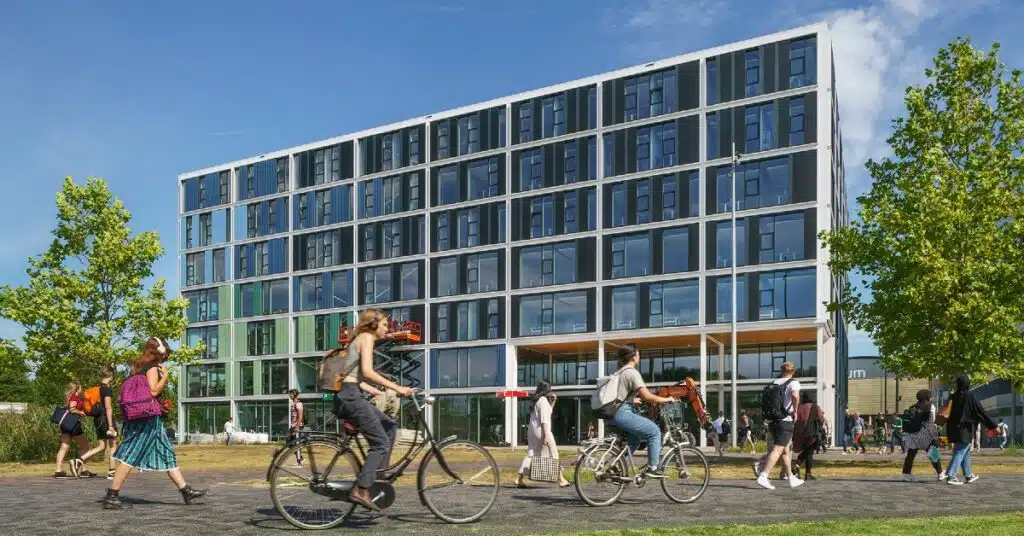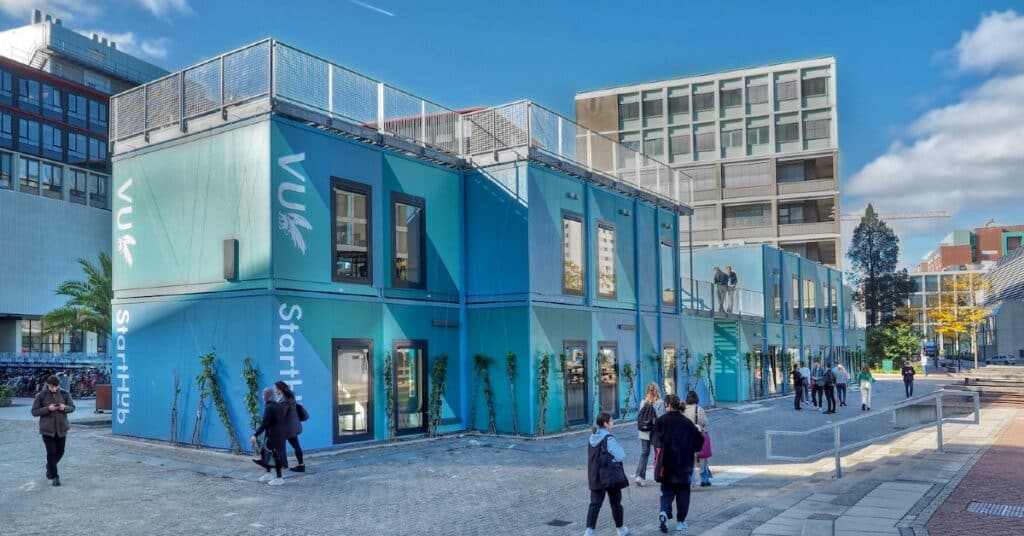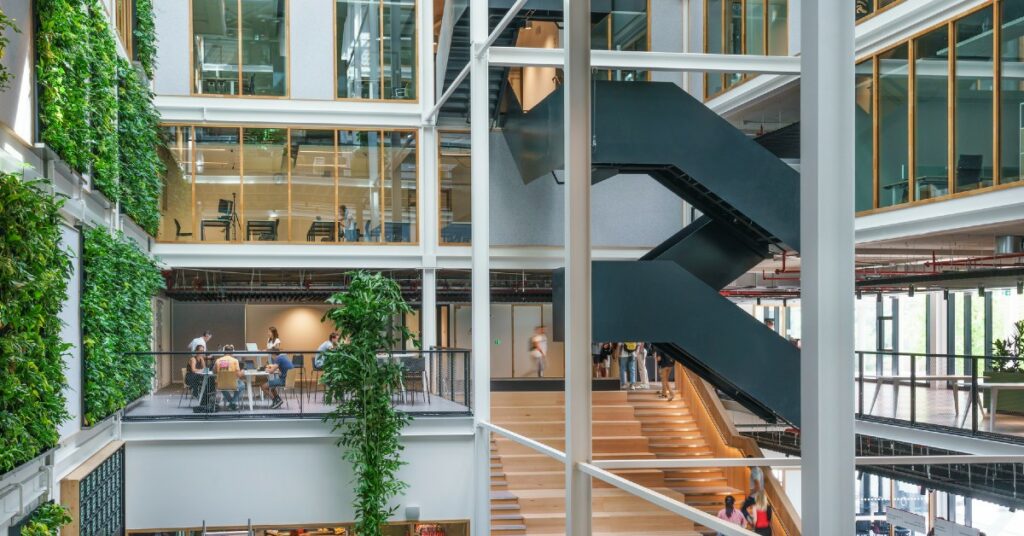Amsterdam has emerged as the perfect place for starting your next tech venture. In June, Dealroom revealed that Amsterdam registered its highest funding during the first half of 2022 and Startup Genome crowned Amsterdam Delta as the top startup ecosystem in the European Union.
While the Dutch capital is flying high with its ability to attract investment and new tech ventures, it is not sitting on its laurels either. With focus on knowledge valorisation and a healthy ecosystem, the Dutch capital is making sure that innovation becomes an imprint of its startup ecosystem.
One of the ways that Amsterdam is ensuring innovation doesn’t take a backseat is by encouraging knowledge institutes to build their own innovation hubs. These innovation hubs serve a lot of purposes including knowledge valorisation but their primary role is to create an impact.
From knowledge transfer to impact hub

It is widely acknowledged now that traditional forms of learning and knowledge transfer will no longer help in this modern and connected world. As a new generation of students enter colleges and universities, they seek an education system that is modern and transformed for the digital age.
One of the ways that knowledge institutes in Amsterdam are staying relevant is by building innovation hubs on campus. Hans Drenth, Director of VU StartHub, says, knowledge institutes are composed of three pillars these days: education, research, and impact.
For him, impact was always a part of knowledge institutes but is now “more and more emphasised and put in the spotlight.” He adds, “It is all about adding value to society, using the knowledge and network one has acquired during their studies.”
The VU StartHub, according to Drenth, not only provides a place for first-time entrepreneurs to pursue their dreams but is also very visible. He also says that VU StartHub comes from a learning that knowledge institutes should have one or more innovation hubs nearby for their students, researchers, and employees.
Siddique Sheikh, Business Developer at LAB42, a digital innovation hub at the University of Amsterdam, sees innovation hubs as a vehicle offering opportunity for research to be commercialised or see the potential commercial application.
“Innovation hubs also allow for research to connect with industry and inform each other on the happenings on each side,” Sheikh adds.
Fostering innovation and solving societal problems

As an impact hub, the innovation hubs at knowledge institutes like the University of Amsterdam and Vrije Universiteit Amsterdam, also aim to foster innovation and solve societal problems. Sheikh says the key mission of LAB42 is to “solve tomorrow’s problems today.”
It aims to do this through the interaction of the students, researchers, and companies housed at LAB42. By reaching its mission, LAB42 sees a way to accomplish other objectives including promoting entrepreneurship even though it’s not the main mandate.
In the case of VU StartHub, they aim to foster a society with a fair economy and host startups that contribute to this mission. “This principle embraces sustainable, circular, non-exploiting business models, based on ‘true pricing,” explains Drenth.
Drenth sees the need for startups who are in the best position to rethink and redesign current models. He says VU StartHub encourages entrepreneurs to start building on their business dream using its affordable office space and tapping into its network or alumni mentoring pool.
LAB42, on the other hand, is pioneering knowledge valorisation that brings more research into practical day-to-day application. “A lot of the research at LAB42 already has applications,” says Sheikh. “The support of companies can open up more possibilities of applications of the research.”
Leading with digital innovation
The city of Amsterdam does not want to be home to pioneers in fintech but also home to digital innovation and future technologies. To that end, these innovation hubs are now playing a key role in putting Amsterdam at the forefront of AI and digital innovation.
At LAB42, Sheikh says he believes the organisation plays a large role by “aggregating the talent and knowledge on AI.” He sees this help attract more AI talent to Amsterdam from other leading innovation hubs abroad.
He also sees innovation hubs like LAB42 as a proof-of-concept to entrepreneurs that there is real, meaningful investment happening in the field of AI and that the city of Amsterdam understands “the crucial role it plays currently and will play in the future of our society.”
With networking and collaboration deemed quintessential at VU StartHub, Drenth sees innovation hubs playing the vital role of attracting the talent needed for Amsterdam to stay ahead.
“We strongly believe in the combination of top-tier knowledge and research and offering a fertile entrepreneurial ecosystem to actually realise impact using these technologies,” he adds.
Sustainable, circular, and able to thrive

Sustainability and circularity are the centrepiece of innovation being driven by innovation hubs at the University of Amsterdam and Vrije Universiteit Amsterdam. Sheikh says LAB42 is built with a circular economy in mind and all of its researchers and companies want to undertake solving the climate crisis.
Drenth sees sustainability and circularity not only as an element of VU StartHub but necessary to create a fair economy. He also dismisses any notion of this being a challenge in the society by emphasising on the fact that “today’s entrepreneurs are already very purpose-driven.”
With the city of Amsterdam helping these innovation hubs by making room for them and supporting the business case, Sheikh sees a future where these innovation hubs become specialised in what they offer and focus on.
He says as the general public becomes more aware of the topic, the innovation hubs will play a larger role in daily lives. At present, LAB42 is focussed on AI and digital innovation but the industry is so large and diverse they are unable to focus on one aspect of AI innovation.
“In ten years as AI plays a larger role in society, most of our technology will have AI components and you will see innovation hubs serve just one section of AI and thrive in that area,” he predicts.










01
From telecom veteran to Dutch Startup Visa success: The Jignesh Dave story